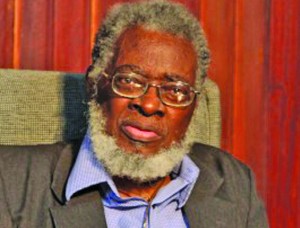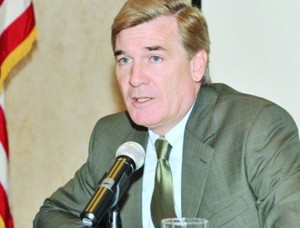
The Guyana government has pulled out of the 2012 United States Agency for International Development (USAID) project, citing flaws in the agreement, Head of the Presidential Secretariat, Dr Roger Luncheon has said.
During his post-Cabinet media briefing last week, Dr Luncheon said the project proposal presented to Guyana did not reflect the input of the government, as well as that of USAID, and on that basis considerable reservations were expressed by the administration.
He explained that the design was considered by Cabinet and both project and design were rejected.
“The project that habitually and conventionally is an engagement between Guyana and its development partner USAID – this one in 2012 departed from that convention. Firstly, we were presented with an agreement to sign, over which we had zero contribution.
“Secondly, when we officially got the design, there was considerable objection, as far as the administration was concerned. This design would have never ever been provided for in any bilateral relationship, as a consequence it was rejected.”
The HPS added that the design allowed for the involvement of USAID in the national life and politics of Guyana. The US$ 13.1 million bilateral agreement was to advance development in health, economic growth, and democracy and governance.
LEAD project

Meanwhile, it was unclear whether a US$ 1.5 million governance project, the Guyana Leadership and Democracy Programme (LEAD), launched back in July is separate from the 2012 agreement or part of the package. The project, which was launched at Cara Lodge, Quamina Street, Georgetown, is aimed at bolstering the functioning of the National Assembly.
Its focus is fortifying the National Assembly by encouraging consensus building; and working with civil society and the public to boost citizens’ engagement with the National Assembly and all parties to support the legislature’s role as an effective deliberative body.
Speaking at the launching, U. S. Ambassador to Guyana D Brent Hardt had expressed excitement, deeming the project as timely.
“Guyana’s National Assembly is grappling with serious issues that will shape the future of the country; how successfully the parties navigate these will help shape the future for the people of Guyana,” he had noted.
Political engagement
The ambassador made reference to whether the parties can have effective local governance or reliable, environmentally friendly power, or deter crime and violence, and prevent financial crimes that distort economic development.
He underscored that his country recognised that the new dispensation in Parliament could pose many challenges which, if not handled with a spirit of compromise and a focus on national interest, can lead to a stalemate and frustration.



